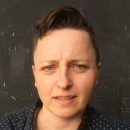Jenny Johnson
Poetry

- Biography
Biography
Jenny Johnson is the author of In Full Velvet (Sarabande Books, 2017). Her poems and essays have appeared in American Poetry Review, Bomb Magazine, New England Review, and elsewhere. Her honors include a Whiting Award, a Hodder Fellowship, and an NEA Fellowship. She has also received awards and scholarships from the Blue Mountain Center, Bread Loaf Writers’ Conference, Virginia Center for the Creative Arts, and Yaddo. She is an Assistant Professor of Creative Writing at West Virginia University, and she is on the faculty of the Rainier Writing Workshop, Pacific Lutheran University’s low-residency MFA program. She lives in Pittsburgh, PA.
Mentor. Workshops and classes in poetry.
Statement: If, as Muriel Rukeyser says, poems are “meeting-places,” I am ever-ready to meet you in those places and to help you to think through the difficult pleasures of creating such encounters. I am eager, too, to discuss how you situate your work in broader social or historical contexts: Are there larger conversations that you wish or aim for your poems to be a part of? Are there poets from the past or present whom you imagine your work might be in dialogue with? If you are not sure yet, as a mentor, I intend to make these meetings happen, too, as we tailor your reading lists. In addition to learning the formal and technical elements of poems, it is important to me that you grow by learning from the diverse literary traditions that your work may be in lineage with.
As a teacher and a fellow poet, I have found that the poems we write are often smarter than we are. At times a promising draft carries a mysterious autonomous logic, one that is difficult for the writer–too close to the thing they’ve made–to fully grasp. As a result, in workshop discussions I press readers to be as descriptive as possible about what they see or hear, so as to mirror back a discrete sense of what a given poem is up to. I will also challenge you to break out of comfortable patterns of composition by recommending radical strategies for revision. My aim when workshopping or talking one-on-one with you about your work is for you to understand your own poems better, recognizing the sensibilities you already have craft-wise, while also spurring you to get back to work experimenting, so that you might see what your poems have the possibility to do through further risk-taking and reinvention.



Social Media